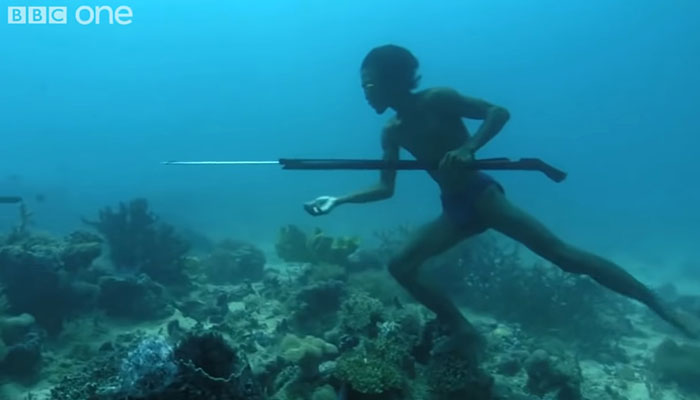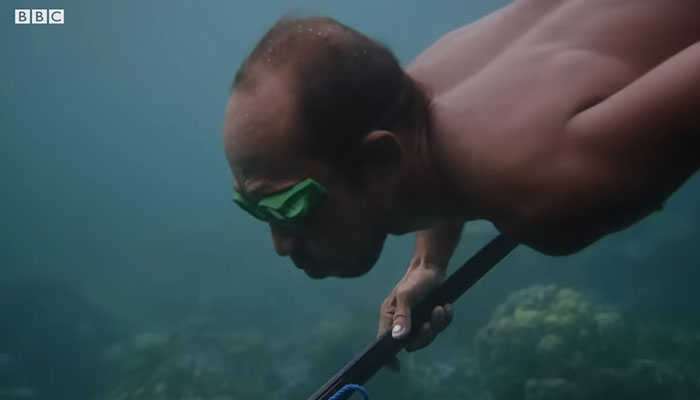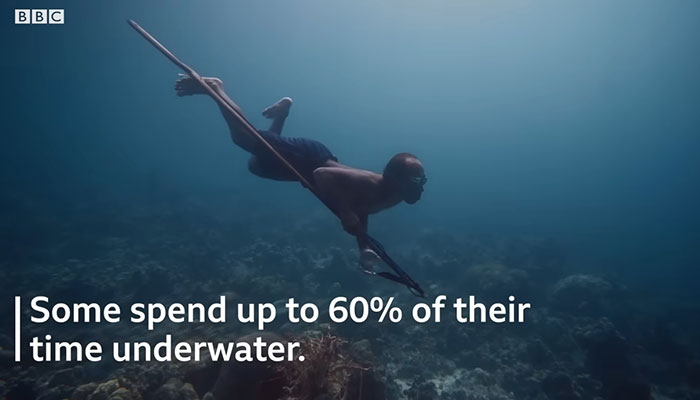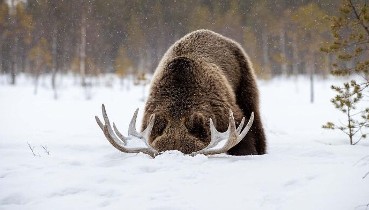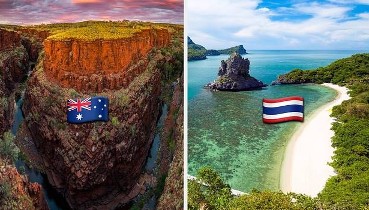
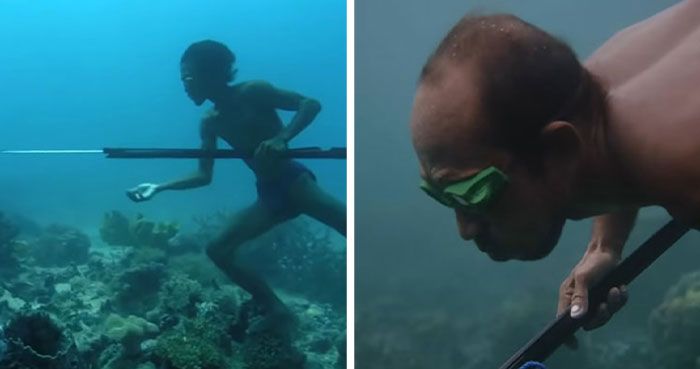
Bajau People Can Hold Their Breath For 13 Minutes Underwater Thanks To Rare Gene
The proof is in the Darwinian pudding. A study providing evidence that humans can genetically adapt to holding their breath underwater for an extended period of time resurfaced. Consequently, one of the research’s authors exclusively opened up to Bored Panda about the scientific findings.
First published in 2018 in the research journal Cell, a group of scientists highlighted the indigenous Bajau people (“Sea Nomads”) of Southeast Asia who live a subsistence lifestyle based on breath-hold diving.
The Sea Nomads’s renowned breath-holding abilities, an average of up to 13 minutes underwater, were highly speculated as to whether they had a genetic basis or not.
Using a comparative genomic study, the researchers showed that natural selection on genetic variants in the PDE10A gene increased the spleen size in the Bajau, providing them with a larger reservoir of oxygenated red blood cells.
A study providing evidence that humans can genetically adapt to holding their breath underwater for a long period of time resurfaced
Image credits: BBC Global
Moreover, researchers found evidence of a strong selection specific to the Bajau on BDKRB2, a gene affecting the human diving reflex.
As a result, the Bajau, and possibly other diving populations, were found to provide a potential new opportunity to study human adaptation to hypoxia tolerance.
Understanding the physiology and genetics of human hypoxia tolerance has important medical implications, the scientists noted.
Image credits: BBC Global
Until the 2018 study, human hypoxia tolerance had only been investigated in high-altitude human populations.
The Sea Nomads have lived an entirely marine-dependent existence, traveling the Southeast Asian seas on houseboats for over 1,000 years, the researchers noted.
Their marine hunter-gatherer existence depends on the food they collect through free diving.
One of the research’s authors exclusively opened up to Bored Panda about the scientific findings
Image credits: BBC Global
They are renowned for their extraordinary abilities, diving to depths of over 70 m with nothing more than a set of weights and a pair of wooden goggles and spending 60% of their daily working time underwater.
Melissa Ilardo, an assistant professor at the University of Utah, Department of Biomedical Informatics, and author of the 2018 study, told Bored Panda in an email: “From our initial paper, it seems likely that the diving ability of the Bajau has a genetic basis.
“However, we have not done further research on this population, so we have not been able to support this finding with any additional evidence.”
Image credits: BBC Global
Nevertheless, these genes (the PDE10A and BDKRB2 genes) are found in all people, the scholar fluent in eight languages explained.
She further explained: “However, there are specific changes (genetic variants) in these genes that can be distinct to different populations.
“The variant we identified in PDE10A that was under selection in the Bajau is also found in other populations.
“For example, we showed in our paper that about 30% of Europeans have the same variant as the Bajau.”
Published in 2018, a group of scientists highlighted the Indigenous Bajau people (“Sea Nomads”) of Southeast Asia
Melissa revealed that her 2018 research prompted new studies on the spleen, including a recent study that showed that Sherpas have larger spleens and that this may help them better tolerate the hypoxia of high altitude.
The expert in human evolutionary genomics has long studied indigenous human populations who have adopted survival strategies that range from desert foraging to deep-sea diving.
“An extraordinary array of adaptations has arisen from these environments and lifestyles, resulting in physiological advantages,” Melissa wrote on her LinkedIn profile.
“My research explores evolution in these superhuman populations,” she added. “Thus far, I have partnered with two populations who engage in the practice of breath-hold diving: The Bajau Sea Nomads of Indonesia and the Haenyeo (all-female) divers of Jeju, Korea.”
The academic runs the Superhumans Ilardo Lab, which is focused on celebrating human strengths instead of hunting for “disease-causing genetic variants.”
“Our research seeks to understand how health is preserved among resilient, adapted individuals,” the lab’s description read.
Readers were left stunned by the Bajau’s remarkable abilities in the water
Recommended Videos
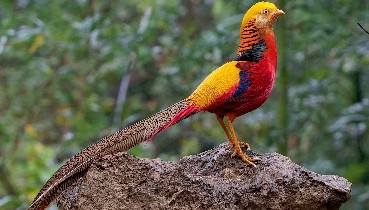 28 Most Beautiful Birds In The World ( +Pictures )13501 views
28 Most Beautiful Birds In The World ( +Pictures )13501 views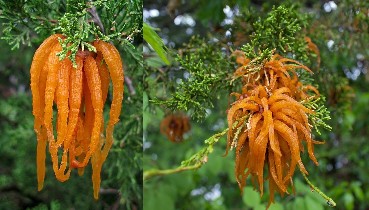 Cedar Apple Rust (Gymnosporangium juniperi-virginianae Schwein.)3360 views
Cedar Apple Rust (Gymnosporangium juniperi-virginianae Schwein.)3360 views-
Advertisements
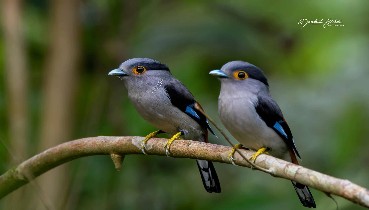 Silver-breasted Broadbill couple280 views
Silver-breasted Broadbill couple280 views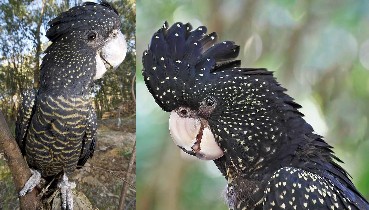 The red-tailed black cockatoo (Calyptorhynchus banksii) also known as Banksian- or Banks' black cockatoo, is a large black cockatoo native to Australia.2649 views
The red-tailed black cockatoo (Calyptorhynchus banksii) also known as Banksian- or Banks' black cockatoo, is a large black cockatoo native to Australia.2649 views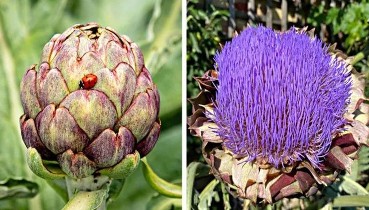 20 Moments When Nature Amazes Us With Its Magic541 views
20 Moments When Nature Amazes Us With Its Magic541 views 25 Outstanding Red Carpet Looks At The 66th Grammy Awards100 views
25 Outstanding Red Carpet Looks At The 66th Grammy Awards100 views Photographer Roy Iwasaki Captured Dreamy-Looking Photos Of Trees In Hokkaido, Japan335 views
Photographer Roy Iwasaki Captured Dreamy-Looking Photos Of Trees In Hokkaido, Japan335 views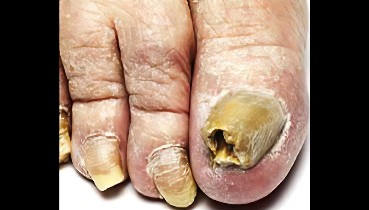 Try One of These 10 Home Remedies for Toenail Fungus4911 views
Try One of These 10 Home Remedies for Toenail Fungus4911 views
